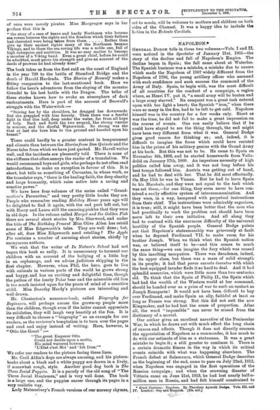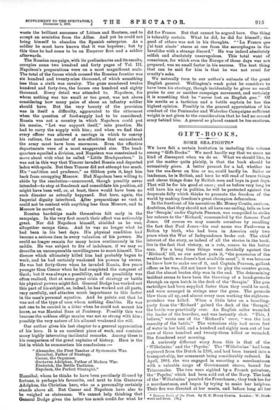NAPOLEON.* GENERAL DODGE tells in these two volnmes—Vols. I and
IL were noticed in the Spectator of January 21st, 1905—the stoiy of the decline and fall of Napoleon's Empire. The decline began in Spain; the fall came about at Waterloo. The Spanish business was a mistake, a mistake due to causes which made the Napoleon of 1807 widely different from the Napoleon of 1796, the young artillery officer who assumed with such confidence and such success the command of the Army of Italy. Spain, to begin with, was the most difficult of all countries for the conduct of a campaign, a region where, as Henri IV. put it, "a small army will be beaten and a large army starved." Its conquest was a great task entered upon with too light a heart; the Spanish "iron," when there were so many in the fire, had to be left to get cold. Napoleon himself was in the country for a few weeks only. Short as was the time, he did not fail to make a great impression on the course of events. One can easily believe that if he could have stayed to see the thing through, the end might have been very different from what it was. General Dodge gives good reason for thinking so ; and, indeed, it is difficult to imagine the force which could have resisted him in the prime of his military genius with the Grand Army at his back. But this was not to be. He came to Spain on November 5th, 1808, and be started homewards from Valla- dolid on January 17th, 1809. An imperious necessity of high politics called him away, and it was not long before his best troops followed him. Austria was getting out of hand, and he had to deal with her. That he did most effectually. On May 11th he was in Vienna. But he had to leave Spain to his Marshals, and they were not equal to the task which was set them,—for one thing, they seem never to have con- trived a really effective system of intercommunication. And they were, in a way, hampered with perpetual instructions from their chief. The instructions were admirably sagacious, it is true ; still, it might have been better that the men who had practically to work the problem out should have been more left to their own initiative. And all along they had to contend with the enormous difficulty of the universal hostility of the Spanish people. General Dodge points out that Napoleon's statesmanship was grievously at fault when he deposed Ferdinand VII. to make room for his brother Joseph. When we think what the Spanish nation was, or believed itself to be—and this comes to much the same thing—we can imagine the fury which was roused by this insulting usurpation. There was decadence, indeed, in its upper class, but there was a mass of solid strength in its people ; it had that parvo assueta iuventus with which the best equipped invader finds it so hard to deal. And it had splendid memories, which were little more than two centuries old. To think that the Spain of Philip II., the Spain which had had the wealth of the Western world at her command, should be handed over as a prize of war to such an upstart as Joseph Bonaparte ! It would not have been difficult to buy over Ferdinand, and make Spain an ally, faithful at least as long as France was strong. But this did not suit the new Kingmaker, and he had lost the sense of proportion. After all, the word " impossible " can never be erased from the dictionary of a mortal.
Our author gives an excellent narrative of the Peninsular War, in which he draws out with much effect the long chain of causes and effects. Though it does not directly concern the appreciation of Napoleon as a commander, it has much to do with our estimate of him as a statesman. It was a great mistake to begin it ; a still greater to continue it. There is a certain dramatic fitness in the way in which its critical events coincide with what was happening elsewhere. The French defeat at Salamanca, which General Dodge describes as the beginning of the end, came to pass on July 22nd, 1812, when Napoleon was engaged in the first operations of the Russian campaign ; and when the crowning disaster of Vittoria came on June 21st, 1813, he had lost nearly half-a- million men in Russia, and had felt himself constrained to • Gnat Captains: Napoleon. By Theodore Ayrault Dodge. Vols. UL and IV. London: Gay and Hancock. [82a. net.] waste the brilliant successes of Liitzen and Bautzen, and to accept an armistice from the Allies. And yet he could not bring himself to abandon the Spanish enterprise. As a soldier he must have known that it was hopeless ; but by this time he had come to be an Emperor first and a soldier afterwards.
The Russian campaign, with its preliminaries and its results, occupies some two hundred and forty pages of Vol. III.
Napoleon's preparations were on a most magnificent scale. The total of the forces which crossed the Russian frontier was six hundred and twenty-nine thousand, of which something less than a sixth was cavalry. The guns numbered twelve hundred and forty-two, the horses one hundred and eighty thousand. Every detail was attended to. Napoleon, for whom nothing was too small or too great, was not above considering how many pairs of shoes an infantry soldier should have. But the very bounty of the provision was in itself a difficulty, aggravated to the uttermost when the question of food-supply had to be considered.
Russia was not a country in which Napoleon could put his maxim, "Let war support itself," into practice. He had to carry the supply with him; and when we find that every officer was allowed a carriage in which to convey his rations, the number of non-effective. that encumbered the army must have been enormous. Even the effective departments were of a. most exaggerated size. The head- quarters equalled a division, and Napoleon was constrained to move about with what he called "Little Headquarters." It was not in this way that Timour invaded Russia and departed laden with spoils. But then Timour did not attempt too much. His "ambition and prudence," as Gibbon puts it, kept him back from occupying Moscow. Had Napoleon been willing to abide by the resolution—announced, though possibly never intended—to stop at Smolensk and consolidate his position, all might have been well, or, at least, there would have been no such disaster as actually happened. But here, again, the Imperial dignity interfered. After preparations so vast it could not be content with anything less than Moscow, and to Moscow he moved on.
Russian hardships made themselves felt early in the campaign. In the very first month their effect was noticeably great. Nor did Napoleon himself, shielded as he was, altogether escape them. And he was no longer what he had been in his best days. His physical condition had become a serious item in every valuation of his powers. He could no longer remain for many hours continuously in the saddle. He was subject to fits of indolence, if we may so describe an unconquerable unwillingness to exert himself. The disease which ultimately killed him had probably begun to work, and he had certainly weakened his powers by excess. He was but forty-three when he invaded Russia, five years younger than Caesar when he had completed the conquest of Gaul; but it was always a possibility, and the possibility was often realised, that at some great crisis of strategy or battle his physical powers might fail. General Dodge has worked out this part of his subject, as, indeed, he has worked out all parts, very carefully, and attaches much importance to this factor in the man's personal equation. And he points out that he was not of the type of men whom nothing disables. He was not one to be carried in a litter when he could not mount his horse, as was Marshal Saxe at Fontenoy. Possibly this was because the noblesse oblige maxim was not so strong with him ; possibly the very nature of his ailment weakened the will.
Our author gives his last chapter to a general appreciation of his hero. It is an excellent piece of work, and contains many highly interesting incidental remarks. Among these is his comparison of the great captains of history. Here is the list in which he summarises his conclusions :— "Alexander, the First Teacher of Systematic War. Hannibal, Father of Strategy. Caesar, the Organiser.
Gustavus Adolphus, Father of Modern War.
Frederick, the Battle Tactician. Napoleon, the Perfect Strategist."
Rannibal, whom he thinks to have been peculiarly ill-used by fortune, is perhaps his favourite, and next to him Gustavus Adolphus, the Christian hero, who as a personality certainly stands above all. But Caesar and Napoleon have also to be weighed as statesmen. We cannot help thinking that General Dodge gives the latter too much credit for what he
did for France. But that cannot be argued here. One thing is tolerably certain. What he did, he did for himself ; the good of others was not in his thoughts. " ' La France que j'ai taut aimee ' stares at one from the sarcophagus in the Invalides with a strange discord." He was indeed absolutely selfish and absolutely unscrupulous. This total want of conscience, for which even the Europe of those days was not prepared, was no small factor in his success. The best thing that can be said for him is that he was not cruel for cruelty's sake.
We naturally turn to our author's estimate of the great English general. Wellington's weak point he considers to have been his strategy, though incidentally he gives no small praise to one or another campaign movement, and certainly it is something that he "never lost an English gun." Of his merits as a tactician and a battle captain he has the highest opinion. Possibly in the general appreciation of his conduct of the Peninsular and Waterloo Campaigns sufficient weight is not given to the consideration that he had no second army behind him. A general so placed cannot be too cautious-







































































 Previous page
Previous page